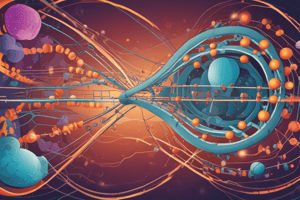Podcast
Questions and Answers
What is the primary goal of the transcription process?
What is the primary goal of the transcription process?
- To transfer genetic information between cells
- To produce an RNA copy of a gene's DNA sequence (correct)
- To replicate DNA
- To assemble amino acids into proteins
Which type of RNA is responsible for carrying genetic information from the nucleus to the cytoplasm of a cell?
Which type of RNA is responsible for carrying genetic information from the nucleus to the cytoplasm of a cell?
- snRNA
- rRNA
- tRNA
- mRNA (correct)
Where is tRNA predominantly located within a cell?
Where is tRNA predominantly located within a cell?
- Endoplasmic reticulum
- Cytoplasm (correct)
- Mitochondria
- Nucleus
What is the main function of rRNA in protein synthesis?
What is the main function of rRNA in protein synthesis?
Which RNA type binds tightly to mRNA and assembles amino acids in the correct order?
Which RNA type binds tightly to mRNA and assembles amino acids in the correct order?
In which step of the transcription process does RNA polymerase bind to a gene's promoter region?
In which step of the transcription process does RNA polymerase bind to a gene's promoter region?
What is the role of tRNA during protein synthesis?
What is the role of tRNA during protein synthesis?
Which RNA type directly transcribes the genetic code from DNA?
Which RNA type directly transcribes the genetic code from DNA?
Flashcards are hidden until you start studying
Study Notes
Protein Synthesis Overview
- Translation is the process where the genetic code in mRNA is decoded to produce a specific sequence of amino acids.
- A polypeptide chain forms until a ribosome encounters a stop codon on the mRNA strand, leading to its release and completion of protein synthesis.
Genetic Code and Codons
- mRNA's instructions for building polypeptides are organized in triplet sequences known as codons.
- Each codon in the mRNA corresponds to a specific amino acid, establishing the framework of the genetic code.
Using the Genetic Code Chart
- The genetic code chart is a wheel where mRNA codons are read from the inside out.
- Start in the center with one of the four big letters for the first letter of the codon.
- Move to the second ring to find the second letter, and then to the smallest set in the third ring for the third letter.
- The outermost ring displays the name of the corresponding amino acid.
Translation Process Steps
- Initially, mRNA binds to a ribosome to begin translation.
- tRNA molecules carrying specific amino acids approach the ribosome to form an initiation complex.
- The anticodon on tRNA pairs with the start codon on mRNA, typically AUG, which codes for methionine and signals the start of protein synthesis.
- The ribosome then moves along the mRNA to the next codon, allowing a new tRNA molecule to pair with it.
- As the first two amino acids are brought together, an enzyme catalyzes the formation of a peptide bond between them.
Codon and Anticodon
- A codon is a three-nucleotide sequence on mRNA that encodes a specific amino acid.
- An anticodon is a complementary three-nucleotide sequence on tRNA that pairs with the corresponding mRNA codon, ensuring the correct amino acid is added.
Studying That Suits You
Use AI to generate personalized quizzes and flashcards to suit your learning preferences.




